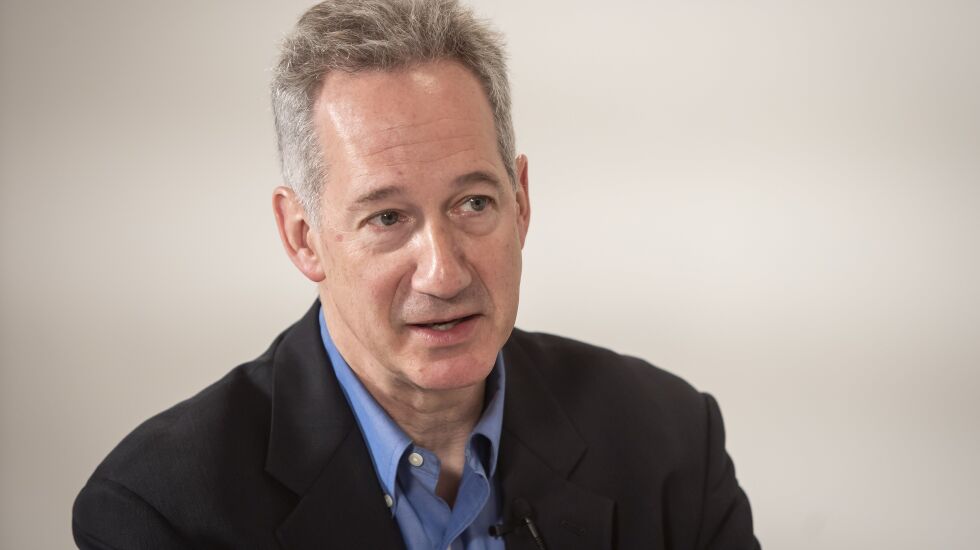
The longest-serving, and perhaps, most aggressive inspector general Chicago has ever had is the new president of the Civic Federation.
Joe Ferguson replaces Laurence Msall, the highly respected public finance expert who left a giant hole in the watchdog landscape when he died suddenly this year.
In replacing the low-key Msall with the higher-profile Ferguson, the Civic Federation has charted a new course.
Unlike Msall, Ferguson is not a public finance expert. But he is a dogged and highly respected former federal prosecutor who has never hesitated to investigate and criticize Chicago mayors, their department heads and members of the City Council. He not only doesn’t mind stepping on important toes. He thrives on it.
In an interview with the Sun-Times, Ferguson acknowledged a major component of his career has been “investigations, and in some respects, prosecutions.”
But he also takes credit for building a “national, award-winning performance audit and evaluation section” during his 12 years as inspector general. The unit not only examined “every form of government program that exists at the city level,” he said, but also “built a data portal that does not exist for any oversight watchdog body in the United States.”
“Even though more of what generates public attention are audits, it’s the investigations that really grab everybody’s heart,” Ferguson said.
“So, this actually is completely within the slipstream of what I’ve been doing for a very long time. And even as a prosecutor, a lot of my cases really were complex fraud matters for which inspectors general and their auditors and their analysts were the originators. It’s all of a piece. These things all connect up, and they’re all necessary in order to … improve effectiveness, efficiency and public trust and legitimacy in government. And that’s exactly what the Civic Federation does with a slightly recalibrated tool kit.”
Ferguson, 63, said he has no intention of making the somewhat staid Civic Federation a more aggressive organization.
“That isn’t how reviews and audits and evaluations of government programs work. They’re not adversarial. They involve dialogue, collaboration, sometimes uneasy collaboration because they reveal uncomfortable truths. … But ultimately, everybody appreciates it’s how we get better,” he said.
“Laurence [Msall] was very candid about things that needed to be said while … trying to provide counsel and advice on how to get to a better place. And that’s exactly what I intend to do,” said Ferguson.
Pressed to identify the biggest fiscal challenge facing Chicago, Ferguson talked about the avalanche of federal stimulus funds that is about to dry up.
“A significant amount of expansion occurred without full consideration of sustainable funding streams, which means hard decisions are gonna have to be made, especially considering the debt load that Chicago also carries, both in terms of operations and in terms of its pensions,” Ferguson said.
Noting that Mayor Brandon Johnson balanced his first budget by allocating only $150 million for the migrant crisis, Ferguson said, “We’re heading into the year with a structural deficit. Technically, the budget’s balanced. Structurally, it is not balanced.”
In a news release announcing Ferguson’s appointment, the Civic Federation said its 15-member search committee found the unique mix of qualities it was seeking in him: “strong, strategic leadership inspired by a genuine passion for fiscal accountability and government efficiency” and a “proven relationship-builder.”
Ferguson served with former Mayor Lori Lightfoot in the U.S. attorney’s office.
When he was appointed by former Mayor Richard M. Daley in 2009 to replace departing Inspector General David Hoffman, Lightfoot was among those who vouched for and recommended her friend Ferguson.
That close relationship initially raised questions about just how independent Ferguson would be in a Lightfoot administration.
But it wasn’t long before Ferguson’s aggressive investigations alienated Lightfoot and their former friendship was replaced by the behind-the-scenes tension that almost always develops between a mayor and his or her watchdog.
Lightfoot clashed openly and repeatedly with Ferguson and ultimately forced him out. She then declared her desire to find a new inspector general who “understands the importance of staying in their lane.”
That raised legitimate questions about whether Lightfoot would be willing to appoint Deborah Witzburg, Ferguson’s hand-picked deputy inspector general for public safety, as Ferguson’s replacement.
Witzburg had worked with Ferguson to produce reports highly critical of the Lightfoot administration in general and the Chicago Police Department in particular.
After a protracted nine-month search, Lightfoot ultimately did choose Witzburg. But Ferguson accused his former boss of being dragged kicking and screaming into what turned out to be a failed attempt to shore up the progressive base that put her in office.







